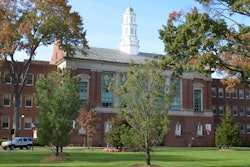The University of Austin Texas (UT Austin) and eight other research universities have recently been granted a 3-and-a-half-year award funded by the National Science Foundation (NSF) — to make the pathway of increasing diversity in academia more accessible for historically underrepresented minorities.
 Photo: Dan Dennis
Photo: Dan DennisThis research project is part of NSF’s Alliances for Graduate Education and the Professoriate (AGEP) program — where universities collaborate to create evidence-based models that transform doctoral education, postdoctoral training, and faculty advancement, particularly for students in mathematics, physical and earth sciences, and engineering (MPESE) fields.
Dr. Marvin L. Hackert, associate dean for the graduate school at UT Austin, explained that underrepresented groups represent about 30% of the overall population. By the time those students get to graduate school, that drops down to only about 10% of the overall graduate student population. Similarly, only about 6% make up the post-doctorate population and about 5% make up the faculty, specifically in the science, technology, engineering and mathematics fields (STEM).
“So, we are trying to address what it takes to minimize this drop off between elementary school to college to graduate school to postdoctoral to faculty positions —to increase the representation of underrepresented groups that have leadership roles and faculty positions at research universities,” said Hackert.
In fact, UT Austin is building this new alliance up from a former pilot program with The California Alliance Research Exchange Program, which provided underrepresented minority students opportunities to learn and network at partner institutions.
“The NSF’s Alliances for Graduate Education and the Professoriate (AGEP) program seeks to advance knowledge about models to improve pathways to the professoriate and success for historically underrepresented minority doctoral students, postdoctoral fellows and faculty, particularly African Americans, Hispanic Americans, Native American Indians, Alaskan Natives, Native Hawaiians, and Native Pacific Islanders, in specific STEM disciplines and/or STEM education research fields,” said Michelle M. Negrón, a spokesperson for NSF, in an email.
Therefore, “If you want to support students in minority groups, you want to have a faculty that has a similar kind of racial and ethnic profile as your students for role models and mentoring,” said Dr. Mark J.T. Smith, dean of the graduate school at UT Austin. “Isolation can be a very difficult challenge for students when they’re part of a group that’s very underrepresented. And so, this [alliance] is very important for us to diversify our faculty.”
 Dr. Mark J.T. Smith
Dr. Mark J.T. SmithAt the same time, “when you increase the diversity among the faculty, you also increase the diversity among the students because diverse faculty attracts diverse students. They’re linked, and that’s why you want to focus on both,” said Smith.
The alliance is open to current UT Austin doctoral graduate students in candidacy and postdoctoral fellows. It is now partnering with the University of California, Berkeley, the University of California, Los Angeles, Stanford University, the California Institute of Technology, the University of Washington, the University of Michigan, Harvard University and the Georgia Institute of Technology.
Each university is “taking the lead on certain aspects of how the program will move forward,” said Hackert.
For example, UT is developing a workshop and training that builds on inclusive hiring practices and holistic reviews of applications, while also studying how other universities have conducted similar interventions, said Hackert.
The University of Washington is developing the advancement of postdocs by creating a portal that acts as a roster for students, residents, and faculty members to network with one another. Harvard University is participating in professional development workshops for junior faculty and potentially developing retreats and training in “a post-COVID world,” added Hackert. Meanwhile, the Georgia Institute of Technology will work with minority-serving institutions to “improve the pipeline for underrepresented groups to get into the Research 1 institutions,” he said.
It’s also “a research project of trying to actually analyze how these interventions will improve the success rate of these underrepresented groups as they go through the pipeline,” said Hackert. If these models work, proven by data, then the partner institutions, including UT, will be able to share those model results with other universities — nationwide — both he and Smith explained. Hackert also described this alliance as a “bonding experience” for deans across the institutions.
“We all benefit from the richness of experiences from the faculty we end up hiring,” added Smith.
While the program is meant to advance faculty for historically underrepresented minorities in specific STEM disciplines and/or STEM education research fields, Negrón added, the program serves “to advance knowledge about the underlying issues, policies and practices that have an impact on [their] participation, transitions and advancement,” as well.
“A large part of this [project] is making a culture change. When you have a program like this, you are able to develop a culture where you can support postdocs and help groom them for faculty positions,” added Smith. “If all faculty leaders are thinking about this and it becomes part of the culture, it makes it easier to support students and postdocs along the way,” he said.
Hackert, a first-generation college student who grew up on a farm himself, said, “There’s a lot of people at the state of Texas here and other places where students are not really aware of the many opportunities that are available to them. So, if you could try to bring them into the fold and mentor them and make them aware of the opportunities, it opens their eyes to the possibilities.”


















